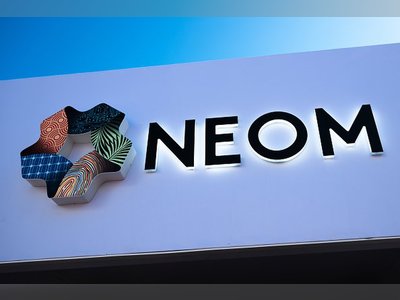Emergence of Chinese AI Startups: Competition Grows Amidst Global Tensions
Chinese tech giants and innovative startups vie for dominance in the rapidly evolving artificial intelligence landscape.
In recent years, China's artificial intelligence (AI) sector has witnessed significant growth, particularly following the debut of ChatGPT in 2022. This has prompted Chinese companies to aggressively develop domestic alternatives, leading to a surge of startups and substantial investments in the field.
Leading this competitive race are major technology firms such as Alibaba and ByteDance, alongside a growing number of well-funded competitors supported by prominent investors.
Over the course of two years, the landscape has evolved, creating challenges for smaller innovators who must carve out distinct niches to avoid potential failure.
The competition has been likened to a high-risk marathon, with ambitions for AI in China reaching unprecedented levels according to insights from MIT's Technology Review.
A select group of elite companies, referred to as the 'Six Tigers'—Stepfun, Zhipu, ModelBest, Moonshot, 01AI, and Peachuan—has emerged as front-runners in the AI domain.
Concurrently, research-focused companies like DeepMind and ModelBest are establishing their influence.
Some firms, such as ModelBest and Moonshot, have shifted from costly foundational model training towards developing consumer-centric applications.
Other companies, like Stepfun and Infinigence AI, are doubling down on research efforts, partially driven by the U.S. restrictions on semiconductor technologies.
Stepfun
Founded in April 2023 by former Microsoft executive Jiang Daxin, Stepfun has rapidly positioned itself as a competitor by leveraging a portfolio of foundational models.
The company is also committed to developing artificial general intelligence (AGI), a goal that many Chinese startups have abandoned.
Backed by investors such as Tencent and funding from the Shanghai government, Stepfun released 11 foundational AI models in 2024, spanning language, visual systems, video, sound, and multimedia.
Its largest language model, Step-2, boasts over a trillion parameters and ranks behind leading models such as ChatGPT and DeepAI on the LiveBench performance evaluation platform.
ModelBest
Founded in 2022 by researchers from Tsinghua University, ModelBest stands out by focusing on efficient small language models, referred to as MiniCPM or 'Little Powerhouses'.
Their latest model, MiniCPM 3.0, operates with 4 billion parameters yet matches the performance of GPT-3.5 on various benchmarks.
The company secured tens of millions of dollars in funding in December 2024, reflecting investor confidence in its approach to real-time processing on devices like smartphones and laptops.
Zhipu
Also originating from Tsinghua University, Zhipu AI has developed strong ties with government and academic institutions, creating advanced foundational models such as ChatGLM and the video generator Ying.
Its flagship model, GLM-4-Plus, is trained on high-quality synthetic data to minimize training costs while matching the performance of GPT-4. However, Zhipu became the first Chinese AI startup to attract U.S. government scrutiny, with over 20 of its entities placed on a restricted trade list by the Biden administration due to national security concerns.
Valued at over $2 billion, Zhipu is one of China's largest AI startups and is reportedly preparing for an initial public offering (IPO).
Infinigence AI
Founded in 2023, Infinigence AI is the smallest firm listed here but has raised around $140 million in funding.
The company focuses on AI infrastructure rather than model development, emphasizing its capability to integrate chips from various brands to optimize AI tasks.
This ability addresses a unique challenge faced by Chinese AI companies amidst U.S. sanctions on semiconductor technology.
Infinigence claims its system can enhance AI training efficiency significantly by synchronizing diverse computing architectures from manufacturers like AMD, Huawei, and Nvidia.
Moreover, it launched the Infini-AI cloud platform to facilitate the development and deployment of AI models utilizing multiple vendor products.
As competition intensifies in the Chinese AI sector, the performance and innovation capabilities of these startups are expected to evolve rapidly, fueled by a complex interplay of local ambitions and international pressures.
The developments in this sector will likely continue to attract significant attention domestically and globally.
Leading this competitive race are major technology firms such as Alibaba and ByteDance, alongside a growing number of well-funded competitors supported by prominent investors.
Over the course of two years, the landscape has evolved, creating challenges for smaller innovators who must carve out distinct niches to avoid potential failure.
The competition has been likened to a high-risk marathon, with ambitions for AI in China reaching unprecedented levels according to insights from MIT's Technology Review.
A select group of elite companies, referred to as the 'Six Tigers'—Stepfun, Zhipu, ModelBest, Moonshot, 01AI, and Peachuan—has emerged as front-runners in the AI domain.
Concurrently, research-focused companies like DeepMind and ModelBest are establishing their influence.
Some firms, such as ModelBest and Moonshot, have shifted from costly foundational model training towards developing consumer-centric applications.
Other companies, like Stepfun and Infinigence AI, are doubling down on research efforts, partially driven by the U.S. restrictions on semiconductor technologies.
Stepfun
Founded in April 2023 by former Microsoft executive Jiang Daxin, Stepfun has rapidly positioned itself as a competitor by leveraging a portfolio of foundational models.
The company is also committed to developing artificial general intelligence (AGI), a goal that many Chinese startups have abandoned.
Backed by investors such as Tencent and funding from the Shanghai government, Stepfun released 11 foundational AI models in 2024, spanning language, visual systems, video, sound, and multimedia.
Its largest language model, Step-2, boasts over a trillion parameters and ranks behind leading models such as ChatGPT and DeepAI on the LiveBench performance evaluation platform.
ModelBest
Founded in 2022 by researchers from Tsinghua University, ModelBest stands out by focusing on efficient small language models, referred to as MiniCPM or 'Little Powerhouses'.
Their latest model, MiniCPM 3.0, operates with 4 billion parameters yet matches the performance of GPT-3.5 on various benchmarks.
The company secured tens of millions of dollars in funding in December 2024, reflecting investor confidence in its approach to real-time processing on devices like smartphones and laptops.
Zhipu
Also originating from Tsinghua University, Zhipu AI has developed strong ties with government and academic institutions, creating advanced foundational models such as ChatGLM and the video generator Ying.
Its flagship model, GLM-4-Plus, is trained on high-quality synthetic data to minimize training costs while matching the performance of GPT-4. However, Zhipu became the first Chinese AI startup to attract U.S. government scrutiny, with over 20 of its entities placed on a restricted trade list by the Biden administration due to national security concerns.
Valued at over $2 billion, Zhipu is one of China's largest AI startups and is reportedly preparing for an initial public offering (IPO).
Infinigence AI
Founded in 2023, Infinigence AI is the smallest firm listed here but has raised around $140 million in funding.
The company focuses on AI infrastructure rather than model development, emphasizing its capability to integrate chips from various brands to optimize AI tasks.
This ability addresses a unique challenge faced by Chinese AI companies amidst U.S. sanctions on semiconductor technology.
Infinigence claims its system can enhance AI training efficiency significantly by synchronizing diverse computing architectures from manufacturers like AMD, Huawei, and Nvidia.
Moreover, it launched the Infini-AI cloud platform to facilitate the development and deployment of AI models utilizing multiple vendor products.
As competition intensifies in the Chinese AI sector, the performance and innovation capabilities of these startups are expected to evolve rapidly, fueled by a complex interplay of local ambitions and international pressures.
The developments in this sector will likely continue to attract significant attention domestically and globally.











